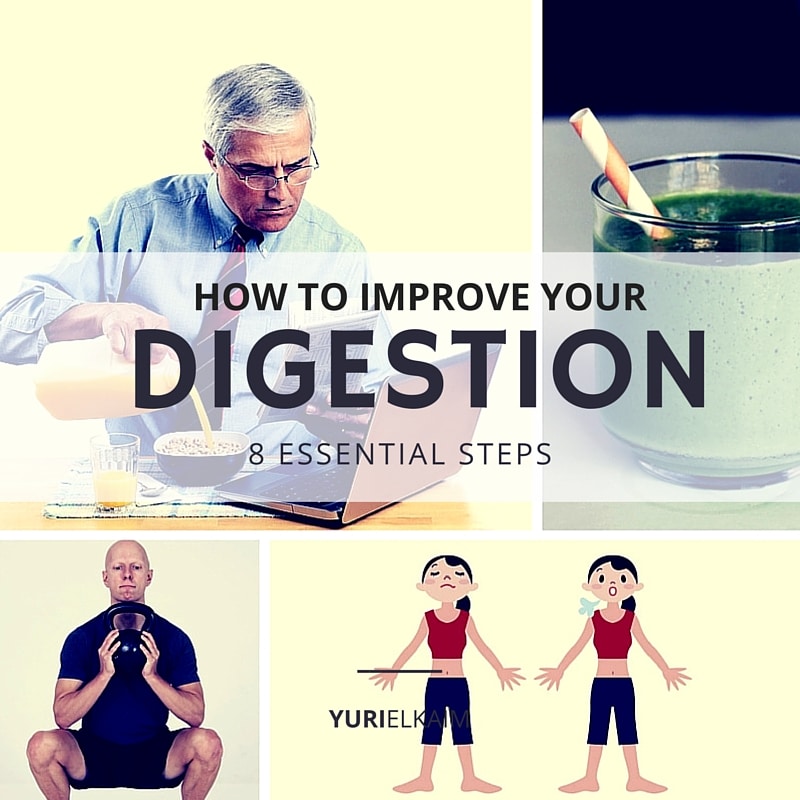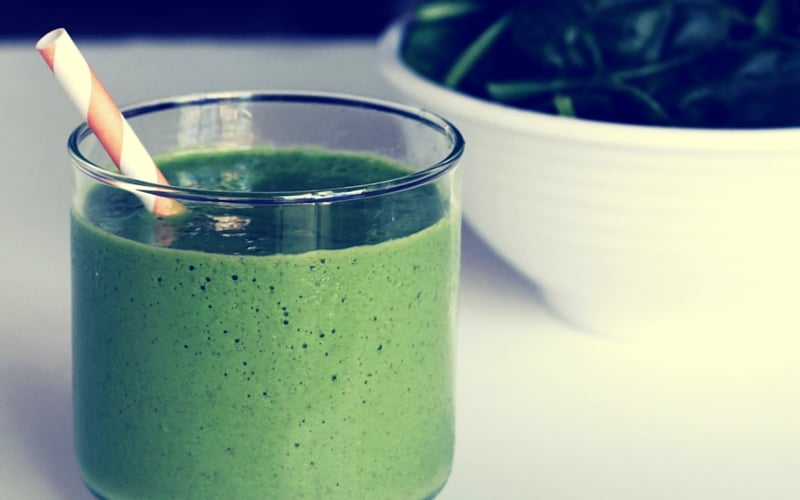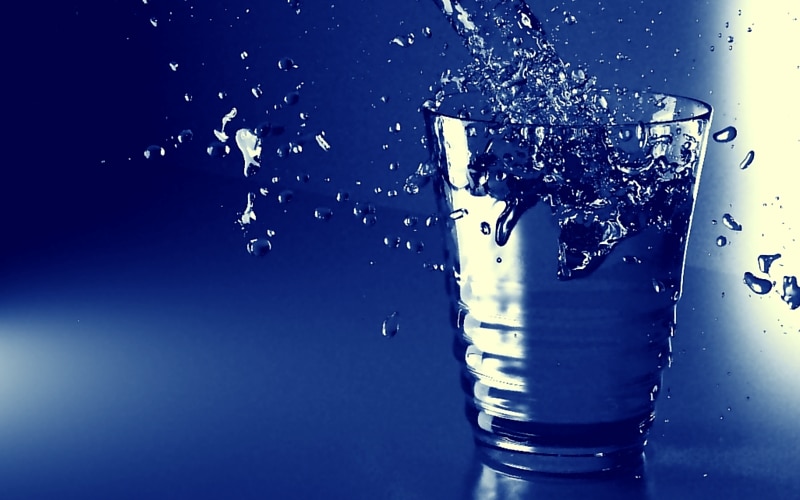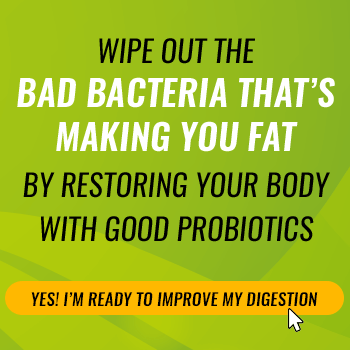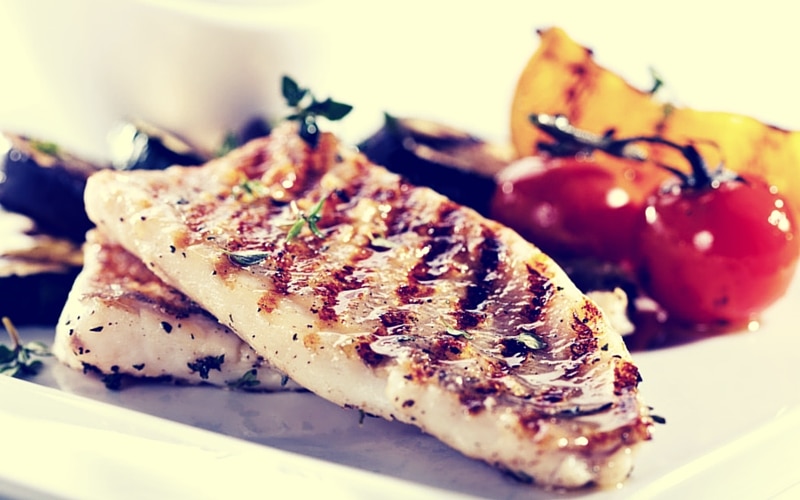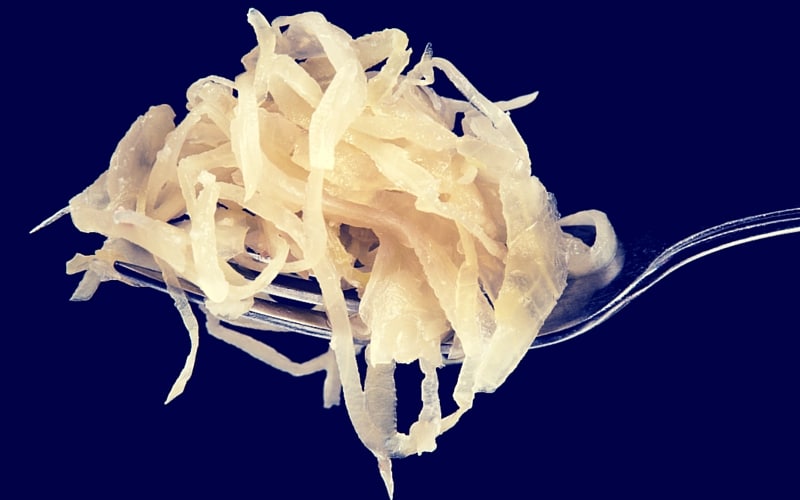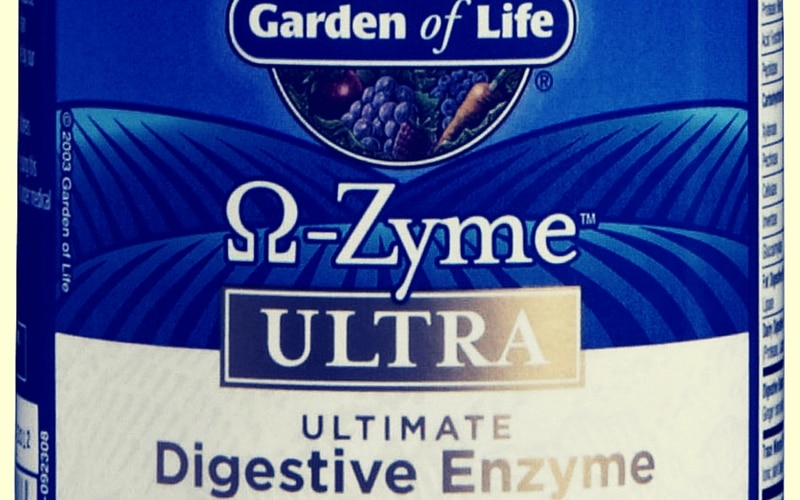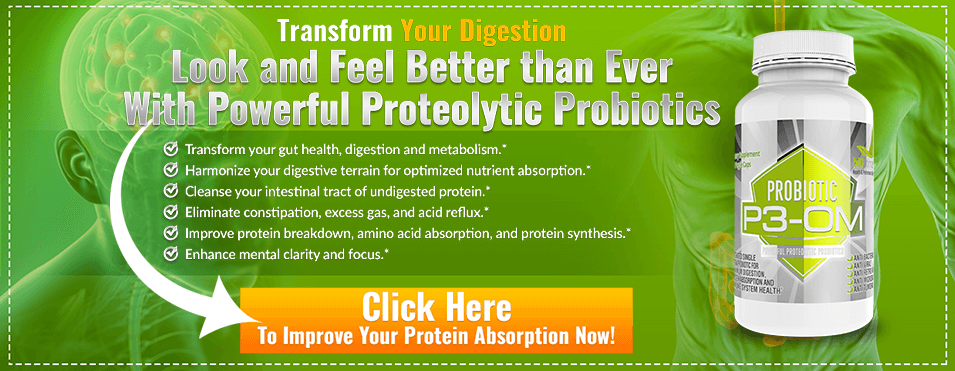Your gut is your body’s furnace, and the food you eat is the coal that keeps it burning. Unfortunately, our modern diet can dampen those flames, and make your gut and your body run at sub-optimal levels. For this reason, knowing how to improve digestion is crucial.
Most people don’t understand just how important this process is, and therefore improving digestion is not a priority for them.(1)
Your immune system is rooted in your gut, and without healthy digestion, you ultimately make yourself susceptible to all kinds of viruses and bad bacteria that can really wreck your health.
With this in mind, here’s how to improve digestion through eight simple, natural remedies.
How to Improve Digestion – Step by Step
1. Chew Liquids, Drink Solids
This might throw you for a loop, but there’s strong logic behind this one.
You may think that digestion starts in your gut, but it actually begins the minute you put food or drink into your mouth. Once you do, enzymes in your saliva get to work, initiating the digestion process.
This is why it’s important to chew your liquids, as funny as this may sound.
Think about it: when you take a sip of a delicious smoothie or vegetable juice, chances are you swallow it quickly because it’s so good.
Here’s the thing: if you do that, you’re not giving that healthy tonic enough time to make contact with the digestive enzymes in your saliva. It means you’re not getting the full benefit of what you’re drinking.
Instead of gulping it down—no matter how much you’re tempted to—swish that healthy liquid around in your mouth for a bit, or even try “chewing” it. You’ll be surprised how far this simple step goes towards improving digestion.
Solids should be chewed as well, but you want to make sure you’re chewing them to the point that you’re practically drinking them down when you’re done!
This allows more of the food to make contact with those digestive enzymes, and breaks down the food into a more easily digestible form.
It’s surprising, but in figuring out how to improve digestion, please understand that simply being more mindful of how you’re eating and drinking can make a tremendous impact on improving digestion.
[Read: 5 Diet Rules to Live By]
2. Avoid Drinking Water with Your Meals
Water is an essential part of nutrition, as it’s a part of every metabolic activity in our body. Chances are you aren’t getting enough, so you should be drinking more.
Just make sure you’re not drinking it while you’re eating.
If you’re used to drinking water every time you eat and you’re looking to improve your digestion naturally, avoiding water with your meals could be a big step for you.
This is because water greatly dilutes the digestive secretions present in the stomach leading to partial and inadequate digestion.
What’s more, cold water is even worse as it ends up “shocking” your gastric secretions that help break down your meals.
By all means, drink water all day long, but please avoid it while you’re eating.
3. Practice Mindfulness While Eating
I mentioned this before in this article, other articles and it’s also a big part of both of my books, The All-Day Energy Diet and the recently released The All-Day Fat-Burning Diet. I can’t say it enough: you should practice mindfulness when you sit down to eat.
I’m not talking any mumbo jumbo here; this is very practical advice.
This may be the last thing you think about as you ponder how to improve digestion, but consider this: as a mindful eater, you make it a point to be very aware of what exactly you’re eating, and how much of it you eat.
Essentially, by practicing mindfulness with each meal, you’re giving yourself an insurance policy against eating unhealthy foods, or eating too much of anything at all. Eating doesn’t become a background process; it receives your full attention.
Savoring your meals allows you to eat just enough and no more. This promotes fantastic digestive health.
4. Do Deep Breathing Exercises
This is in line with mindfulness. Not only does it allow you to relax and enjoy your meal, it also readies your body for digestion.
A deep breath causes the diaphragm to descend further into the abdomen. Once it descends like this, its dome essentially massages the stomach, thereby coaxing it to secrete more digestive juices.
This is definitely one of the more obscure tips to improve digestion, but trust me, it’s very effective.(3)
5. Pay Attention to Food Combinations
The medical community has scientifically looked at how to improve digestion in many different ways, and in this study of the human body, we have learned that different types of food take a different amount of time to be digested.(2)
As a result, the stomach pushes out easily digestible food faster as opposed to hardier foods that take more time to be properly digested.
With this in mind, food combining is something to be mindful of; you don’t want to mix together foods that drastically differ in digestion times, as this can “gum up” your system.
For example, fruits and raw items take much less time to be digested than proteins that require a much more elaborate digestive process for the nutrients they contain to be fully extracted, absorbed and adequately assimilated by the body.
[Read: 9 Common Nutrient Deficiencies (and How to Fix Them)]
Therefore, it’s wise to combine foods that will be digested well together, and avoid combinations—such as fruits and proteins—that may be problematic.
For example, vegetables and protein can be combined. Proteins may include vegetarian or non-vegetarian varieties.
Carbohydrates, which start their digestive process from the oral cavity, can be combined with vegetables.
Fiber can generally be eaten with anything, as it helps move the food through the gut and is also required to avoid constipation.
6. Work Out
When you decided to figure out how to improve digestion naturally, there’s a good chance you were thinking it would only require changes to your diet.
Not so at all.
Technically, exercise doesn’t improve digestion directly. When you exercise, blood is shunted away from the digestive tract to the working muscles, effectively shutting down digestion. Exercise simply makes you hungrier.
However, aerobic exercise does release endorphins and encephalin into the blood stream. These chemicals help in bringing about a feeling of euphoria.
This helps in busting overall stress levels, which further enhances your digestive well-being.
[Read: 3 Ways Stress Causes Weight Gain]
Aerobic exercise is also known to spur on the peristaltic movements of the gut, thereby helping you move your bowels faster and easier. This is especially great for people suffering with constipation.
7. Take Probiotics
If the word bacteria makes you reach for your anti-bacterial lotion, consider this: your gut is filled with bacteria that helps break down the food you eat.
Well, let me clarify that—it relies on good bacteria.
There certainly is bad bacteria which can make you sick, especially if it proliferates in your gut, thus harming your digestion.
The way to combat this is to inoculate and repopulate your gut with good bacteria, and the easiest way to do this is by adding probiotic foods to your diet.
You can do this with supplements, or also through cultured foods such as miso, sauerkraut and kefir.
[Try: Healthy Gut Smoothie]
8. Use of Digestive Enzymes
If you’ve been struggling to figure out how to improve digestion for some time now, chances are your digestion is seriously compromised.
With that being the case, you could use a little help. In addition to following the preceding tips to improve digestion, you should also consume digestive enzymes to push the process along.
Available at any decent health food store, digestive enzymes are little pills that contain enzymes like proteases, lipases and amylases that help break down your food and make the digestive process run a lot smoother. Buy a bottle and try taking a few with each meal.
I hope this tips give you some solid insights on how to improve digestion. As you can see they’re all in keeping with the natural remedies I promote in all of my work.
In short, it’s not complicated at all. This is something you can take care of in your kitchen.
And you absolutely should. Improving digestion is such an important step towards boosting your health, so give these eight essential steps a try today!
How to Improve Digestion FAQ
What foods improve digestion?
How long does it take to improve digestion?
How to improve digestion of fats?
How to improve digestion of carbs?
How to improve digestion of proteins?
What affects digestion time?
Why do digestion problems occur?
What yoga poses help with digestion?
What supplements can I take to improve digestion?
How does fiber help digestion?
What are symptoms of poor digestion?
- bloating
- gas
- indigestion
- belching
- heart burn
- fatigue (especially after eating meat)
- abdominal discomfort
Enjoy This Article?
Additional References:
1. Hertzler, SR; Clancy, SM (May 2003). Kefir improves lactose digestion and tolerance in adults with lactose maldigestion. J Am Diet Assoc. 103(5):582-7.
2. Aglaée Jacob (February 2013). Gut Health and Autoimmune Disease — Research Suggests Digestive Abnormalities May Be the Underlying Cause. Today’s Dietitian. 15(2): 38
3. Barry M Popkin; Kristen E; D’Anci; Irwin H. Rosenberg (August 2010). Water, Hydration and Health. Nutr Rev. 68(8): 439–458. PMID: PMC2908954
4. Joanne Slavin (April 2013). Fiber and Prebiotics: Mechanisms and Health Benefits. Nutrients. 5(4): 1417–1435. PMCID: PMC3705355

